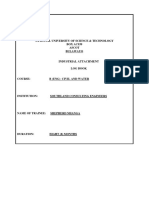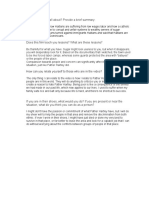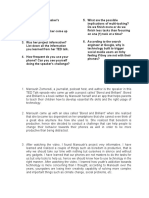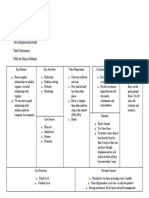Ascontem
Ascontem
Uploaded by
Robie CasimiroCopyright:
Available Formats
Ascontem
Ascontem
Uploaded by
Robie CasimiroOriginal Description:
Original Title
Copyright
Available Formats
Share this document
Did you find this document useful?
Is this content inappropriate?
Copyright:
Available Formats
Ascontem
Ascontem
Uploaded by
Robie CasimiroCopyright:
Available Formats
Casimiro, Robie L.
BSA 101-A
Assignment in Contemporary World
1. Has McLuhan’s ideal of a ‘global village’ become reality?
The global village, McLuhan felt, would bring about a utopia. Drawn closely together by media, people would be
like neighbors, living in ‘a Pentecostal condition of universal understanding and unity’ (1964: 80). As McLuhan
predicted, media and globalization have connected the world and its people from end to end so that we can indeed
imagine the world as a village. However, the connection, closeness, and interdependence of the global village have
brought no collective harmony or peace. Instead, globalization and media are combining to create the dark,
dystopian world that Mumford dreaded. They do so in three key areas: economic, political and cultural.
2. To what extent do global media serve as guardian of free speech, democracy, and justice?
Freedom of speech gives special rights and duties to the media. The media inform society on matters of public
interest and create an important platform for public debate, scrutiny and reflection. Therefore, independent media
and quality journalism are considered to be the “watchdog” of a democratic society. Media democracy is a
democratic approach to media studies that advocates for the reform of mass media to strengthen public service
broadcasting and develop participation in alternative media and citizen journalism in order to create a mass media
system that informs and empowers all members of society and enhances democratic values. Media is also defined
as "medium" a way of communicating with others. With regards to the extent of global media to justiceThough
journalists were sometimes targeted because of their reporting on organized crime or drugs, the assassination of a
journalist was relatively rare and was met by public outcry. Journalists were primarily at physical risk in war zones.
Now, in our age of globalization, the entire world can be a war zone. Numerous forces compete for wealth and
power, within and across borders, including governments, state militias, paramilitary groups, political parties, drug
cartels, religious organizations, insurgents, corporations, terrorists, and others. All these groups can be threatened
by the work of a crusading reporter. All have targeted reporters. Globalization has made the world a harrowing
place for journalists.
3. What is the ‘message’ of new social media?
The message of new media – digital media, such as computers, tablets, and cell phones –have the potential to
invigorate and transform political life in the modern world. That new media can allow alternative voices within and
across borders which will enlarge the public sphere, can offer the opportunity for more people to be involved with
the political action and civil society. These new media have characteristics – mobile, interactive, discursive, and
participatory. Because of the low cost and ease of posting text, photos, video, music, and other material online,
digital media allow for the possibility of multiple, varied voices and views that can challenge and question those in
power (Shirky, 2008). Citizens worldwide can post photos and dispatches from breaking news events via cell
phones, computers, and webcams. Activists around the globe can exchange information online and coordinate
plans. Bloggers and online newspapers can find new outlets and audiences to challenge government and authority.
But new social media can be manipulated by those who have power.
You might also like
- Attachment Log BookDocument30 pagesAttachment Log BookShepherd Nhanga93% (15)
- How Does The Study of Demography Help Governments and EconomiesDocument1 pageHow Does The Study of Demography Help Governments and EconomiesNorelyn Cabadsan Payao100% (2)
- Starbucks at The ShantyDocument7 pagesStarbucks at The ShantyDrin Mendoza56% (9)
- 03 - Activity - 1 - Ilagan, Aila Marie CDocument1 page03 - Activity - 1 - Ilagan, Aila Marie CAila Marie C. Ilagan100% (1)
- 09 Elms Quiz 1 - ARGDocument2 pages09 Elms Quiz 1 - ARGBae MaxZ100% (4)
- ESSAYDocument1 pageESSAYAeria Byun100% (1)
- 09 Activity 1Document2 pages09 Activity 1Jhead Tristine Encina67% (3)
- 06 BasicAccTP1 SantosDocument3 pages06 BasicAccTP1 SantosJohn Santos100% (1)
- Mcluhan's Global Village, Becomes Reality or NotDocument1 pageMcluhan's Global Village, Becomes Reality or NotElysa Jana Lasap100% (1)
- Watch "Lost in Translation" by Janesh Rahlan. Then, Answer The Following QuestionsDocument1 pageWatch "Lost in Translation" by Janesh Rahlan. Then, Answer The Following QuestionsBae MaxZ100% (1)
- 10 Elms Quiz ARGDocument1 page10 Elms Quiz ARGBae MaxZ100% (3)
- GE1706 Delos Reyes, Ashley Judd V. Delos Reyes, Erika. Dimailig, Janica Mae. Goc-Ong, Crismarinel G. Julongbayan Analyn FDocument2 pagesGE1706 Delos Reyes, Ashley Judd V. Delos Reyes, Erika. Dimailig, Janica Mae. Goc-Ong, Crismarinel G. Julongbayan Analyn FAnalyn Faytaren100% (3)
- 01 - Worksheet - 1A (REPUBLIC ACT 1425 IMPORTANCE)Document2 pages01 - Worksheet - 1A (REPUBLIC ACT 1425 IMPORTANCE)Matrix100% (1)
- 02 Task Performance 1Document1 page02 Task Performance 1hahaa dimobakomissNo ratings yet
- 05 Worksheet 2 STSDocument3 pages05 Worksheet 2 STSjeromeagnes100% (1)
- Activity 2 SM-WPS OfficeDocument2 pagesActivity 2 SM-WPS OfficeRobie CasimiroNo ratings yet
- Christianity: 1. What Is Your Chosen Religious Ritual About?Document1 pageChristianity: 1. What Is Your Chosen Religious Ritual About?Jhee G67% (3)
- TCWDocument1 pageTCWElizabeth DagdagNo ratings yet
- Lost in Translation - ARGDocument1 pageLost in Translation - ARGKenji CruzNo ratings yet
- Answer The Following QuestionsDocument2 pagesAnswer The Following QuestionsRosefel Ann Cuizon100% (1)
- If You Were Jose Rizal and Was Given The Chance To Be Guest of The Real Audiencia de Manila and of GovDocument1 pageIf You Were Jose Rizal and Was Given The Chance To Be Guest of The Real Audiencia de Manila and of GovjjNo ratings yet
- 9 Quiz 1Document2 pages9 Quiz 1Syne Panillos100% (2)
- EM 08 eLMS Act 2Document1 pageEM 08 eLMS Act 2Christine Joy NatividadNo ratings yet
- NSTP Worksheet PuzzleDocument2 pagesNSTP Worksheet PuzzleMatrix100% (1)
- What Is The Value Proposition of STI When It Is Established? What Is Its Mission Statement?Document1 pageWhat Is The Value Proposition of STI When It Is Established? What Is Its Mission Statement?AilaJeanineNo ratings yet
- 04 Worksheet 1Document2 pages04 Worksheet 1Ronald varrie BautistaNo ratings yet
- Week 11 Mental Frames EthicsDocument1 pageWeek 11 Mental Frames Ethicsshadow demon0% (1)
- Listen To The Song Mateo Singko by Dong Abay (03 Audio 1)Document1 pageListen To The Song Mateo Singko by Dong Abay (03 Audio 1)Pamela Jeane RemiendoNo ratings yet
- How Did Curiosity Help Revolutionized The Things We Use? Provide ExamplesDocument1 pageHow Did Curiosity Help Revolutionized The Things We Use? Provide ExamplesAnthony Gili100% (2)
- Directions: Identify The Culture of The Organizations You Belong To. Write Your Answers in The Table Below. (3 Items X 10 Points)Document1 pageDirections: Identify The Culture of The Organizations You Belong To. Write Your Answers in The Table Below. (3 Items X 10 Points)FalconsNo ratings yet
- What Is The Value Proposition of STI When It Is EstablishedDocument1 pageWhat Is The Value Proposition of STI When It Is EstablishedNorelyn Cabadsan Payao100% (1)
- 06 ELMS Quiz 1 EntrepDocument1 page06 ELMS Quiz 1 EntrepNya Karu100% (1)
- Mathemathics ChisquareDocument1 pageMathemathics ChisquareJerone Ivan Ponteras0% (1)
- What Is The Video All About? Provide A Brief Summary.: How Can You Relate Yourself To Those Who Are in The Video?Document1 pageWhat Is The Video All About? Provide A Brief Summary.: How Can You Relate Yourself To Those Who Are in The Video?ACE BRIANNo ratings yet
- Facmann MCIIDocument12 pagesFacmann MCIIMondemamon Mamon100% (2)
- 03 Worksheet 1 GaviolaDocument5 pages03 Worksheet 1 GaviolaRachel Avila GaviolaNo ratings yet
- TED TALK Manoush ZomorodiDocument2 pagesTED TALK Manoush ZomorodiCaine Valerian100% (1)
- 01 Online Activity 1 - ARG - OP - BACCAY CHRISTINEDocument1 page01 Online Activity 1 - ARG - OP - BACCAY CHRISTINEChristine Daine BaccayNo ratings yet
- Freedom DiagramDocument1 pageFreedom DiagramRachel Anna Esman Lorenzo100% (3)
- 01 Activity 1 - ARG: Facility Management Concepcion, Stephanie Kyle S. BM303Document2 pages01 Activity 1 - ARG: Facility Management Concepcion, Stephanie Kyle S. BM303Stephanie Kyle Concepcion100% (3)
- Is Math The Language of The UniverseDocument1 pageIs Math The Language of The UniverseJamieNo ratings yet
- Art Appreciation Classical Art (Reinamie Dayrit)Document2 pagesArt Appreciation Classical Art (Reinamie Dayrit)DDDD100% (1)
- Hard To Imagine SUMMARY (Maximum of Seven (7) Sentences)Document2 pagesHard To Imagine SUMMARY (Maximum of Seven (7) Sentences)qweinna rtyuiopNo ratings yet
- Week 5 Preppin Myself - ARGDocument1 pageWeek 5 Preppin Myself - ARGKenji CruzNo ratings yet
- In What Year Did We Have The Least Number of DisastersDocument1 pageIn What Year Did We Have The Least Number of DisastersNorelyn Cabadsan Payao100% (2)
- Task Performance: Digital ReflectionDocument13 pagesTask Performance: Digital ReflectionRos Gaming100% (2)
- 04 Readings 1 Discussion - RPHDocument1 page04 Readings 1 Discussion - RPHCherry Ann Grace Flores100% (1)
- Solution:: I. Problem Solving (15 Items X 3 Points)Document5 pagesSolution:: I. Problem Solving (15 Items X 3 Points)Irish Mae JovitaNo ratings yet
- Task Performance Research Paper Outline I. BackgroundDocument6 pagesTask Performance Research Paper Outline I. BackgroundmichaelabatraloNo ratings yet
- Week 2 Exploring DiversityDocument2 pagesWeek 2 Exploring DiversityJason LlanesNo ratings yet
- NSTP Answer Sheet 02Document1 pageNSTP Answer Sheet 02Adrian Pangan100% (1)
- LiolioDocument2 pagesLioliorose ann liolio100% (1)
- Task Performance in The Entrepreneurial MindDocument1 pageTask Performance in The Entrepreneurial MindBianca Nicole LiwanagNo ratings yet
- TaskDocument1 pageTaskIrish Mendoza100% (2)
- Hard To Imagine SUMMARY (Maximum of Seven (7) Sentences)Document2 pagesHard To Imagine SUMMARY (Maximum of Seven (7) Sentences)qweinna rtyuiop100% (1)
- 01 Quiz 1B - ARG (RIZALS)Document2 pages01 Quiz 1B - ARG (RIZALS)Ashley Aquino100% (1)
- SOLIMAN - 10 - Journal - 1Document1 pageSOLIMAN - 10 - Journal - 1Jerick SolimanNo ratings yet
- Name: Miko Joshua C. Calalang BSBA2ADocument1 pageName: Miko Joshua C. Calalang BSBA2Asen paiNo ratings yet
- Give What Is Asked BelowDocument3 pagesGive What Is Asked BelowHanz Galvez100% (4)
- Media Imperialism in The Global EraDocument5 pagesMedia Imperialism in The Global EraMd. Mashrur Haque NafisNo ratings yet
- Democratization ofDocument18 pagesDemocratization ofDEEPAK GROVERNo ratings yet
- Action Plan HeadingsDocument2 pagesAction Plan HeadingsHong Da ZhangNo ratings yet
- Telia Company Annual and Sustainability Report 2022 ENG FINALDocument263 pagesTelia Company Annual and Sustainability Report 2022 ENG FINALDahme NIOUADDNo ratings yet
- The Four Terrible Things That Are Destroying Boys in Our CultureDocument4 pagesThe Four Terrible Things That Are Destroying Boys in Our CultureСаша МироноваNo ratings yet
- Ecdis Mca Uk RISK ASS MGN 285Document32 pagesEcdis Mca Uk RISK ASS MGN 285JJohn GGnanaveluNo ratings yet
- Session 1-Introduction To The Course DMA301mDocument17 pagesSession 1-Introduction To The Course DMA301mPhương ThảoNo ratings yet
- Bedini SGDocument75 pagesBedini SGYorsh TorresNo ratings yet
- Theories of Corporate PersonalityDocument4 pagesTheories of Corporate PersonalityAman TiwariNo ratings yet
- 387228-InfernalMight CommonLore V2.0Document19 pages387228-InfernalMight CommonLore V2.0Kreggo100% (4)
- User'S Manual: Fiscal PrinterDocument23 pagesUser'S Manual: Fiscal PrinterFric TechnologiesNo ratings yet
- Course Name: Human Resource Management Case Analysis:: Nitish at Solutions UnlimitedDocument4 pagesCourse Name: Human Resource Management Case Analysis:: Nitish at Solutions UnlimitedSwetha RavichandranNo ratings yet
- Allen StockDocument3 pagesAllen StockNeil GudiwallaNo ratings yet
- DIP - Image Restoration PDFDocument29 pagesDIP - Image Restoration PDFEng. Dr. Dennis N MwighusaNo ratings yet
- The Vodka WarDocument3 pagesThe Vodka WarLaura TicoiuNo ratings yet
- FCG Company ProfileDocument9 pagesFCG Company ProfileAmr GawalyNo ratings yet
- 16 Inch ScrollDocument20 pages16 Inch ScrollToots AsensiNo ratings yet
- Future Labs Technology: Boost Your Career With SAP Course in DelhiDocument5 pagesFuture Labs Technology: Boost Your Career With SAP Course in DelhiFuture labs TechnologyNo ratings yet
- Bengkel Biologi SmartGDocument6 pagesBengkel Biologi SmartGK XuanNo ratings yet
- Lesson 7 INTRODUCTION TO STORED PROCEDURESDocument70 pagesLesson 7 INTRODUCTION TO STORED PROCEDURESBNo ratings yet
- En - PFM 14 Product Information 2.0Document2 pagesEn - PFM 14 Product Information 2.0Tùng Hồ ThanhNo ratings yet
- Next Level Thinking 10 Powerful Thoughts For A Successful and Abundant Life 1St Edition Osteen Online Ebook Texxtbook Full Chapter PDFDocument69 pagesNext Level Thinking 10 Powerful Thoughts For A Successful and Abundant Life 1St Edition Osteen Online Ebook Texxtbook Full Chapter PDFpamela.cundiff996100% (14)
- New SHS Learning Module Stat ProbDocument49 pagesNew SHS Learning Module Stat ProbAaron Paul Casabar100% (1)
- Target Shots II-unlocked PDFDocument285 pagesTarget Shots II-unlocked PDFsaumya ranjan nayakNo ratings yet
- H-4007-0069-01-A Including Tool Setting in Your ProgramDocument6 pagesH-4007-0069-01-A Including Tool Setting in Your ProgramDörky LefieuwNo ratings yet
- Heartland Classic BrochureDocument16 pagesHeartland Classic Brochurelowtech4No ratings yet
- Taskalfa 220Document300 pagesTaskalfa 220Andrew Tan LeeNo ratings yet
- A Mathematical Model of Non-Destructive Disassembly ProcessDocument12 pagesA Mathematical Model of Non-Destructive Disassembly ProcessTJPRC PublicationsNo ratings yet
- Brochure EC200E StageV ENDocument24 pagesBrochure EC200E StageV ENHarisNo ratings yet
- Ebook Database Processing 12Th Edition Kroenke Test Bank Full Chapter PDFDocument39 pagesEbook Database Processing 12Th Edition Kroenke Test Bank Full Chapter PDFMalloryHartmanmkgqd100% (13)
- STREIF Formwork PDFDocument23 pagesSTREIF Formwork PDFformwork companyNo ratings yet

























































































